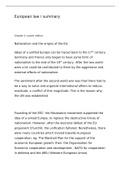Samenvatting
Summary De succesformule voor Europees recht deel 1
- Instelling
- Universiteit Van Amsterdam (UvA)
Dit is een samenvatting van de verplichte literatuur voor de eerste 3 weken van Europees recht, het Engelse deeltentamen, waarvoor ruim 150 pagina´s gelezen moeten worden, terwijl dit veel sneller kan! Deze samenvatting is uitgebreid, maar niet de langdradig, waardoor je als onwetende nog steeds a...
[Meer zien]




